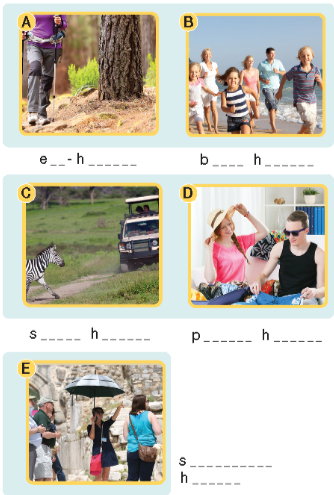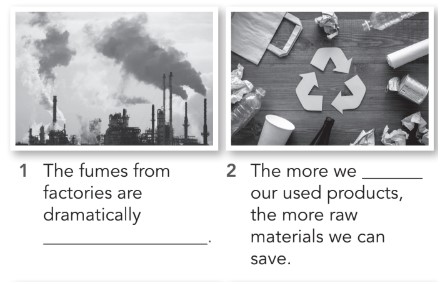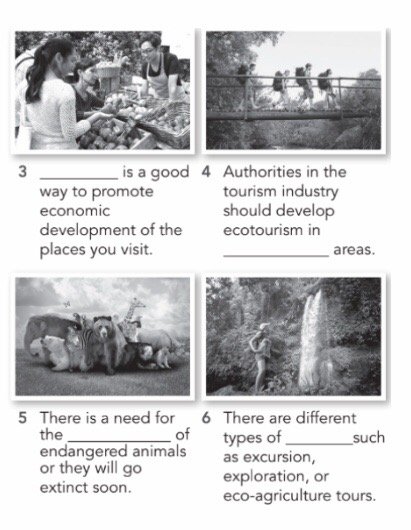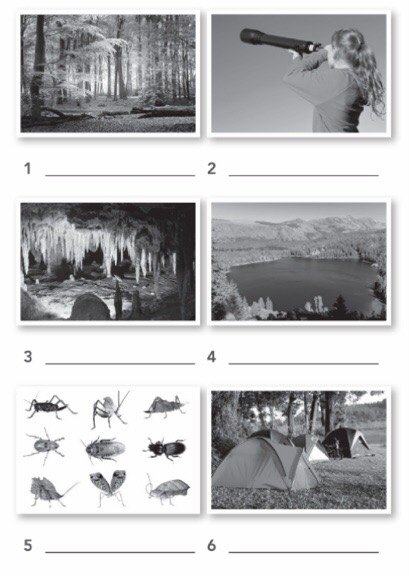2. Complete these sentences with the highlighted words in 1.
(Hoàn thành các câu sử dụng các từ được làm nổi bật ở bài 1.)
1. We can help local artists make a ________ by buying handmade arts and _________.
2. Many tourists are not ________ of the ________ of their actions on the local community.
3. Both local people and tourists should be ________ for protecting the environment.
responsible (adj): có trách nhiệm
aware (adj): có nhận thức
impact (n): tác động
profit (n): lợi nhuận
crafts (n): đồ thủ công
|
1. profit - crafts |
2. aware - impact |
3. responsible |
1. We can help local artists make a profit by buying handmade arts and crafts.
(Chúng tôi có thể giúp các nghệ nhân địa phương kiếm lợi nhuận bằng cách mua các tác phẩm thủ công mỹ nghệ của họ.)
2. Many tourists are not aware of the impact of their actions on the local community.
(Nhiều khách du lịch không nhận thức được tác động của hành động của họ đối với cộng đồng địa phương.)
3. Both local people and tourists should be responsible for protecting the environment.
(Cả người dân địa phương và khách du lịch phải có trách nhiệm bảo vệ môi trường.)

Các bài tập cùng chuyên đề
Bài 1 :
Vocabulary: Ecotourism
(Từ vựng: Du lịch sinh thái)
1. Below is what ecotourists do. Match each sentence on the left with its explanation on the right.
(Dưới đây là những gì các nhà du lịch sinh thái làm. Ghép mỗi câu ở cột bên trái với phần giải thích của nó ở cột bên phải.)
|
1. I am responsible for protecting the environment. |
a. I know that when I travel, I may damage the environment. |
|
2. I am aware of the damage I may cause to the environment. |
b. I understand it is my duty to protect the environment. |
|
3. I help people learn about the environmental impact of tourism. |
c. I buy handmade things to help local artists and craftsmen or craftswomen earn some money and introduce their culture to more people. |
|
4. I help local businesses make a profit. |
d. I help local people earn some money by suing local services and buying local products. |
|
5. I buy traditional arts and crafts to help local culture and businesses. |
e. I tell people about the positive and negative effects of tourism on the environment. |
Bài 2 :
Choose the correct word to complete the conversation.
(Chọn từ đúng để hoàn thành đoạn hội thoại.)
Mai: Ms Hoa, what is (1) mass / sustainable tourism?
Ms Hoa: Well, the aim of this kind of tourism is to (2) protect / damage the environment, respect local culture, and keep (3) benefits / profits local.
Mai: Can you give me an example?
Ms Hoa: When travelling, we should not (4) litter / impact on the street. We should also be (5) aware / responsible of the local traditions and respect them.
Mai: So is this kind of tourism similar to (6) ecotourism / mass tourism?
Ms Hoa: Well, it's a form of sustainable tourism because it has a positive (7) impact / craft on the environment.
Bài 3 :
2. Which is your favourite type of holiday? What do you usually do? Tell your partner.
(Loại kỳ nghỉ yêu thích của bạn là gì? Bạn thường làm gì? Nói với bạn bè.)
Bài 4 :
1. Put the activities in the appropriate column.
(Đặt các hoạt động vào cột thích hợp.)
|
1. uy local foods |
7. litter |
|
2. go cycling |
8. plant trees |
|
3. drive a car |
9. put rubbish in the bins |
|
4. eat a lot of meat |
10. reuse used items |
|
5. limit energy use |
11. take rubbish with you |
|
6. reduce waste |
12. use plastic bags |
|
Good for the environment |
Bad for the environment |
|
|
|
Bài 5 :
1. Match the definitions below with the correct words from the glossary on page 111.
(Ghép các định nghĩa bên dưới với các từ đúng trong bảng chú giải trên trang 111.)
1. _______: to cut all the trees down in an area
2. _______: to experience something
3. _______: process of making the environment dirty
4. _______: to keep something safe
5. _______: a long and difficult journey made on foot
Bài 6 :
1. Choose the correct word to complete each sentence.
(Chọn từ đúng để hoàn thành mỗi câu.)
1. Many tourists damage / reduce the environment when they are travelling.
2. When ecotourists explore / discover a place, they often enjoy learning / talking about the culture there.
3. One way to help the local community is to buy local arts and parts / crafts.
4. Please go / follow walking paths and trails when you go hiking.
5. Sustainable / Mass tourism helps people keep benefits / profits local.
6. Tourists should not follow / hunt wild animals to protect the local environment.
7. Ecotourists respect the local businesses / cultures by learning about the customs and traditions of the places they visit.
8. Aware / Responsible tourists will avoid damaging the environment when they travel.
Bài 7 :
2. Complete these sentences by filling in each blank with ONE word in the box. There is ONE extra word you will not need.
(Hoàn thành các câu sau bằng cách điền vào mỗi chỗ trống MỘT từ trong hộp. Có MỘT từ bổ sung mà bạn sẽ không cần.)
aware impact litter responsible
for on of (x2) to
1. Everyone is (1) _________(2) _________ protecting the environment.
2. Tourists should be (3) _________(4) _________ the possible damage that travel may cause to the environment.
3. The (5) _________ (6) _________ tourism on the local crea could be both positive and negative.
4. Many tourists throw (7) _________ (8) _________the streets.
Bài 8 :
3. Choose the best answers to complete the sentences.
(Chọn các câu trả lời đúng nhất để hoàn thành các câu.)
1. There are many things for tourists to ________ on the island.
A. explore
B. explain
C. explode
D. expand
2. Avoid ________ water when you take a bath.
A. washing
B. waiting
C. wasting
D. waking
3. There is a ________ market along this river.
A. flowing
B. swimming
C. floating
D. boating
4. ________ tourism has a lot of negative impact on the environment.
A. Mass
B. Massive
C. Eco-
D. Eco-friendly
5. We followed a ________ in the forest.
A. way
B. trail
C. road
D. street
6. Are you ________ of the importance of protecting the environment?
A. interested
B. aware
C. fond
D. responsible
7. There is a ________ for you to walk along the coast.
A. street
B. highway
C. path
D. driveway
8. ________ people are very friendly and welcoming to the tourists.
A. Home
B. Inside
C. Foreign
D. Local
Bài 9 :
1. Look at the picture of types of holidays (A-E) and fill in the missing letters.
(Nhìn vào hình ảnh về các loại ngày lễ (A-E) và điền vào các chữ cái còn thiếu.)

Bài 10 :
2. Match what the speakers (1-5) say to the types of holidays (A-E) in Exercise 1.
(2. Ghép những gì người nói (1-5) nói với các loại ngày lễ (A-E) trong Bài tập 1.)
1 __ "I love lying on the beach!"
2 __ "I love seeing new places and visiting museums."
3 __ "Seeing wildlife in the jungle is amazing!"
4 __ "I love holidays that have guided tours, food and accommodation included."
5 __ "I enjoy exploring nature, and I want to protect it!"
Bài 11 :
1. Fill in each with reduce, touch, make, drop, volunteer, take, donate, or stay.
(Điền vào mỗi với reduce, touch, make, drop, volunteer, take, donate hoặc stay.)
Too much tourism can damage the environment, so it's important to be a responsible traveller when you go on holiday. Here are some simple steps.
• When you go sightseeing, don't 1) _____ the architecture or monuments. They're very old and you could damage them. Leave place as you found it for take the next visitor to enjoy and don't 2) _____ souvenirs home.
• If you're visiting the local wildlife, remember to 3) ________ on trails and don't 4) drop litter as this will pollute the environment. Don't 5) _____ a lot of noise either because you will scare the animals.
• If you really want to help, why not 6) ______ money to a local charity or 7) volunteer to help with a conservation project?
• And remember, by going on holiday closer to home, you can 8) _______ your carbon footprint.
By following these simple steps, we can all be more responsible travellers and enjoy our beautiful planet for years to come.
Bài 12 :
1. Look at the pictures and complete the sentences with the correct form of the words / phrases from the list.
(Nhìn tranh và hoàn thành câu với dạng đúng của các từ / cụm từ trong danh sách.)
harm the environment remote
ecotourism conservation
buy local products recycle


Bài 13 :
3. Use the following words to complete the leaflets: conserve, environment, communities, limit, reuse, save.
(Sử dụng các từ sau để hoàn thành tờ rơi: bảo tồn, môi trường, cộng đồng, hạn chế, tái sử dụng, tiết kiệm.)
WORLD WATER DAY
Bài 14 :
1. Match the words below with the pictures 1-6.
(Nối các từ dưới đây với các hình 1-6.)
lush forests camping site
sky watching cave
lake insects

Bài 15 :
2. Using the words in Exercise 1 to complete the sentences.
(Sử dụng các từ trong bài tập 1 để hoàn thành câu.)
1. Please clean up before leaving the _____________.
2. They are going to create fishing zones by that ___________.
3. There are many __________ in Việt Nam owing to its humid climate.
4. Light pollution in Hà Nội prevents us from ____________ at night.
5. There is a large collection of __________ in Việt Nam’s national museum of nature.
6. The natural habitat inside the _____________ needs to be explored by scientists.
Bài 16 :
3. Choose the word or phrase (A, B or C) that is CLOSEST in meaning to the underlined part in each sentence.
(Chọn từ hoặc cụm từ (A, B hoặc C) đúng nghĩa cho phần gạch chân trong mỗi câu.)
1. Community help tours are not the same as ecotours.
(Các tour du lịch trợ giúp cộng đồng không giống như các chuyến du lịch sinh thái.)
A. not similar to (không tương tự với)
B. different to (khác với)
C. different of (khác nhau của)
2. The walk through the forest was actually dangerous.
(Chuyến đi bộ xuyên rừng thực sự rất nguy hiểm.)
A. ride through (đi qua)
B. trek through (đi qua)
C. drive through (lái xe qua)
3. Many students have joined in voluntary activities to conserve the environment such as clearing up the rubbish at the beach.
(Nhiều sinh viên đã tham gia các hoạt động tình nguyện để bảo vệ môi trường như dọn rác ở bãi biển.)
A. participated (đã tham gia)
B. took part in (đã tham gia)
C. done (hoàn thành)
4. I want to learn how to limit our waste.
(Tôi muốn học cách hạn chế lãng phí của chúng ta.)
A. learn about limiting (tìm hiểu về hạn chế)
B. learn about limit (tìm hiểu về hạn chế)
C. practice limiting (thực hành hạn chế)
5. My father has wide knowledge of the elephants.
(Cha tôi có kiến thức rộng về loài voi.)
A. knows little about (biết ít về)
B. knows much about (biết nhiều về)
C. knows nothing of (không biết gì về)
Bài 17 :
1. Match the words on the left with the definitions on the right.
(Ghép các từ bên trái với các định nghĩa ở bên phải.)
1. environment
2. remote
3. harm
4. exotic
5. conservation
a. far away from where people live
b. unique, unusual and exciting
c. damage the protection of natural things from being destroyed
d. the protection of natural things from being destroyed
e. natural features (plants, animals, weather, etc.) around a place
Bài 18 :
2. Put the words into the correct column.
(Đặt các từ vào các cột chính xác.)
|
Good for the environment |
Bad for the environment |
|
|
1. litter
2. plant trees
3. put rubbish in the bin
4. buy local foods
5. go cycling
6. drive a car
7. eat a lot of meat
8. limit energy use
9. take rubbish with you
10. use plastic bags
Bài 19 :
6. Complete the sentences with the words below.
(Hoàn thành các câu với các từ dưới đây.)
join know learn trek different
1. I'd like to _______ in ecotours to remote villages when I visit Sa Pa.
2. Trekking tours are _________ from package tours.
3. We can __________ about how to recycle items from this video.
4. Ecotourists often prefer to _________ through local villages to experience the culture.
5. Conservation tours have various benefits that each of us should _______ about.
Bài 20 :
7. Choose the correct answer (A, B, or C) to replace the underlined part of the sentence.
(Chọn câu trả lời đúng (A, B, hoặc C) để thay thế phần gạch chân của câu.)
1. The walk through Cát Tiên National Park was very entertaining.
(Cuộc đi bộ qua Công viên quốc gia Cát Tiên rất thú vị.)
A. ride through (đi qua)
B. trek through (đi qua)
C. drive through (lái xe qua)
2. Community help tours are not the same as ecotours.
(Các chuyến tham quan trợ giúp cộng đồng không giống như các chuyến du lịch sinh thái.)
A. not similar to (không tương tự với)
B. different to (khác với)
C. different of (khác nhau của)
3. Look at that mountain range! You can enjoy the stunning view from here.
(Nhìn vào dãy núi đó! Bạn có thể tận hưởng cảnh quan tuyệt đẹp từ đây.)
A. spectacular (adj): ngoạn mục
B. popular (adj): phổ biến
C. clear (adj): rõ ràng
4. The deforestation in this area is becoming more serious.
(Tình trạng phá rừng ở khu vực này ngày càng nghiêm trọng.)
A. cutting down of trees (chặt cây)
B. air pollution (ô nhiễm không khí)
C. soil pollution (ô nhiễm đất)
5. There was an accident at the intersection. Please choose a different route.
(Có một vụ tai nạn ở ngã tư. Vui lòng chọn một con đường khác.)
A. junction (n): giao lộ
B. pavement (n): vỉa hè
C. corner (n) góc
Bài 21 :
Choose the correct answer A, B, C or D.
Ecotourism is a form of sustainable travel that supports the local environment instead of putting more pressure ____ it and exploiting its resources.
-
A.
to
-
B.
for
-
C.
on
-
D.
at


















Danh sách bình luận